 4 June 2014 marks the 25th anniversary of the quelling of the demonstrations in Tiananmen Square. The event was a near-death experience for the Chinese Communist Party, which turned its tanks on the workers and students in the centre of Beijing. Even today, the subject is taboo in China itself; the subject is never discussed, and when mentioned (rarely), it is captured in the vague term “turmoil.”
4 June 2014 marks the 25th anniversary of the quelling of the demonstrations in Tiananmen Square. The event was a near-death experience for the Chinese Communist Party, which turned its tanks on the workers and students in the centre of Beijing. Even today, the subject is taboo in China itself; the subject is never discussed, and when mentioned (rarely), it is captured in the vague term “turmoil.”
Yet the event still haunts China today. It haunts China’s reputation. Because the subject has never been discussed, debated, or mourned, it still stands as a central point in the critique of China’s government around the world. However much China’s economy grows, its education system changes, its international standing increases, the “memory hole” in the centre of its contemporary history remains and can always be brought up as a criticism – as long as China refuses to deal with this most traumatic event in its recent past, it cannot fully engage with a world where openness, transparency, and connection is so much more important than it was even in 1989.
Nonetheless, the last quarter-century has seen massive changes in China. Today the country is much more internationalized, and engages with the world in a way that was unimaginable in 1989. Today, social media are a major force in Chinese society, a network of communication which the Tiananmen demonstrators could only have dreamed of. There have been real changes.
So can China move on from 1989? Should it do so without coming to terms with the events in Tiananmen Square? On 4 June, I’ll be discussing this question with a panel of guests on BBC Radio 3 – LSE director Craig Calhoun and journalist Jonathan Mirsky who were both in the square in 1989, along with economics professor Keyu Jin, NPR Beijing correspondent Louisa Lim who’s written about the Tiananmen survivors, and Timothy Garton Ash who reminds us that Poland had its first semi-free elections on the same date, 4 June 1989 – that will be live at 10 pm in the UK or available as a download or on the web immediately afterward here. Do listen in and join the debate.
Rana Mitter is Professor of the History and Politics of Modern China at the Oxford Oriental Institute and Fellow of St Cross College




No Comment